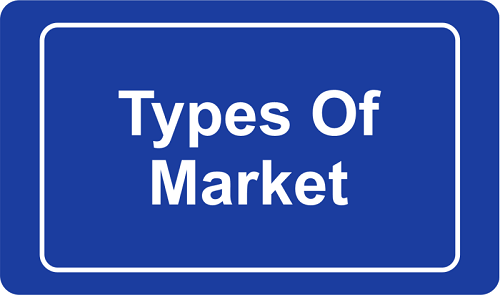Market: What It Means in Economics, Types and Common FeaturesA market is an area where participants congregate to facilitate the trade of services and goods. Buyers and sellers are typically the participants engaged. The market could be actual or physical, such as a retail store wherein individuals interact in person, or virtual, such as an online marketplace where sellers and customers do not meet in person. The presence of a marketplace, buyers, and sellers, as well as a good or service that can be bought and sold, are some of the important components which help define a market. 
Market Meaning ExplainedA market is a specific area where two or more individuals get together to perform an economic transaction, including one that doesn't usually involve legal tender. A market transaction involves the transfer of goods, services, information, money, or any combination of these from one party to another party. These things or services are usually provided in exchange for money. In simple terms, Markets are places where sellers and buyers come together and interact. Typically, a trade requires the participation of at least two parties. However, in most scenarios, a third party is also involved in creating competition and reinstating market equilibrium. Due to this, a market with perfect competition is characterized, among other things, by a high volume of active sellers and purchasers. In addition to the general definition, the term "market" can apply to a variety of instruments depending on the context. For example, it might be used to describe the financial markets, where stocks are exchanged, and it may also refer to a group of individuals seeking a specific product or service in a specific area, such as the real estate market. It may describe a business or industry, like the global diamond market. The market economy is a kind of economic system that determines some choices to assist in shaping the market. In this system, factors such as investments, production, distribution, and price of goods and services are determined by demand and supply from businesses and individuals. A market economy is thus unplanned, unlike a planned or command economy, wherein the government determines all of the respective parameters. Supply and DemandOne of the fundamental principles of economics is the concept of supply and demand. A market determines the costs of commodities and other services regardless of the situation. Supply and demand are what drive these rates. Demand is produced by buyers, whereas the sellers produce and fulfill supply. When demand and supply are balanced, markets attempt to achieve some level of price equilibrium. However, this equilibrium can be set off by various aspects besides price, such as income, expectation, technologies, production costs, and the volume of consumers and sellers. Simply, consumer demand and willingness to pay dictate the number of goods and services offered. When consumers want more products and services, sellers expand their production. Then, to make a profit, producers usually raise the prices. When consumer demand declines, businesses must reduce their pricing, and, as a result, the number of goods and services they provide are consumed equally among consumers. This eliminates the extra stock presence in the market. Virtual and Physical MarketsPhysical places where transactions take place can serve as representations of markets. These consist of physical outlets and other identical enterprises that sell products to wholesale markets and distributors on an individual basis. In contrast, the markets can also be virtual. Online shops & auction sites are two instances of markets where deals can be made purely online without any physical contact between the parties. Markets may develop naturally or in order to facilitate ownership rights over products, services, and information. Markets are frequently divided into developed and developing markets when considered at a national or more specific regional level. This distinction is based on various variables, such as levels of income and the degree to which a country or region is open to foreign trade. Common Features of Market
Special characteristics may define a market; they are also essential for the operation of the market. The most key features that influence a market are as follows: AreaThis is the marketplace where transactions among sellers and buyers take place. A market in economics spans an area that serves as the point of interaction between producers or sellers and consumers or buyers rather than being associated with a particular location. It can also refer to the general area where everyone participating is spread. Note that this doesn't always indicate a physical location. Technological innovation and modern communication methods have expanded the market for products. Buyers and SellersBoth buyers and sellers are necessary for a market to function, but there can be no market without someone buying what someone else is selling. These organizations, including companies, people, and even governments, may carry out their interactions physically and virtually (because of the internet). CommodityA market refers to particular product availability rather than a particular location. Because each market depends on a certain commodity, there needs to be a related commodity existing for a market to exist. The wheat market, for instance, buys and sells wheat as a commodity. Although there are many different types of electronics, they all fall under the umbrella category of electronics. CompetitionCompetition is essential for a market to operate. Among both buyers and sellers, there needs to be free competition. The lack of market competition causes sellers to set various prices for the same homogeneous good or service. Other characteristics include price and the ability to purchase and sell products and services freely. Types of Markets
Physical MarketsThis type of market is a location where buyers and sellers may interact in person and transact for the desired goods and services. Physical markets include places like shopping centers, grocery stores, and retail stores. Non-Physical Markets/Virtual MarketsIn these markets, consumers use the internet to buy products and services. In this type of market, goods and services transactions occur online rather than through face-to-face interactions. Examples include online shopping for groceries, clothing, and other forms of electronic commerce. Auction MarketMany people come together at an auction market to buy and sell particular lots of products. In auction marketplaces, items are put up for bid, offers are accepted, and the item is subsequently sold to the highest bidder. The Market for Intermediate GoodsThese markets offer the goods that are used as raw materials in the manufacture of other goods. Black MarketAn illegal market where transactions occur without the knowledge of the authorities or other regulating bodies is referred to as a "black market". Numerous unlawful markets exist at present. They are more difficult to track because many solely comprise cash payments or non-traceable kinds of payment. Members of the black market fill the gap when a particular commodity or service is scarce in the market. These so-called "shadow markets" are more common where the prices direct the sale of particular goods or services, especially when demand is great or high. One instance of an unauthorized or black market is ticket scalping. When there is a great demand for event or theatre tickets, scalpers will enter the scene, buy up a large quantity, and then sell them at exorbitant prices on the black market. Knowledge MarketThis type of market is a platform for exchanging knowledge and knowledge-based goods. Financial MarketThe term 'financial market' refers to a market where liquid assets (money) are traded. Below mentioned are some of the subcategories of the Financial Market:
|
 For Videos Join Our Youtube Channel: Join Now
For Videos Join Our Youtube Channel: Join Now
Feedback
- Send your Feedback to [email protected]
Help Others, Please Share










